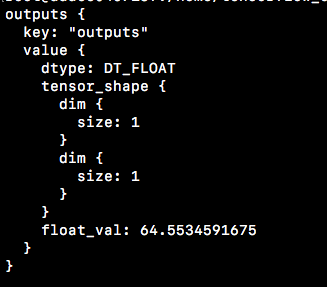I have exported a DNNClassifier model and run it on tensorflow-serving server using docker. After that I have written a python client to interact with that tensorflow-serving for new prediction.
I have written the following code to get the response from tensorflow-serving server.
host, port = FLAGS.server.split(':')
channel = implementations.insecure_channel(host, int(port))
stub = prediction_service_pb2.beta_create_PredictionService_stub(channel)
request = predict_pb2.PredictRequest()
request.model_spec.name = FLAGS.model
request.model_spec.signature_name = 'serving_default'
feature_dict = {'a': _float_feature(value=400),
'b': _float_feature(value=5),
'c': _float_feature(value=200),
'd': _float_feature(value=30),
'e': _float_feature(value=60),
'f': _float_feature(value=5),
'g': _float_feature(value=7500),
'h': _int_feature(value=1),
'i': _int_feature(value=1234),
'j': _int_feature(value=1),
'k': _int_feature(value=4),
'l': _int_feature(value=1),
'm': _int_feature(value=0)}
example= tf.train.Example(features=tf.train.Features(feature=feature_dict))
serialized = example.SerializeToString()
request.inputs['inputs'].CopyFrom(
tf.contrib.util.make_tensor_proto(serialized, shape=[1]))
result_future = stub.Predict.future(request, 5.0)
print(result_future.result()) I m not able to figure out how to parse that float_val number because that is my output. Pls help.
I m not able to figure out how to parse that float_val number because that is my output. Pls help.
